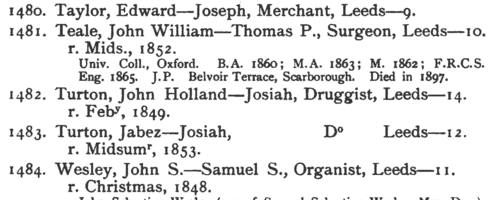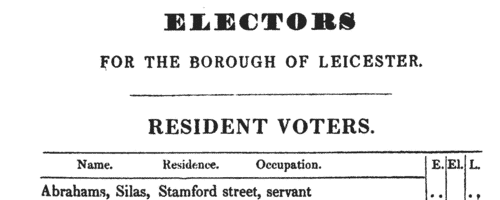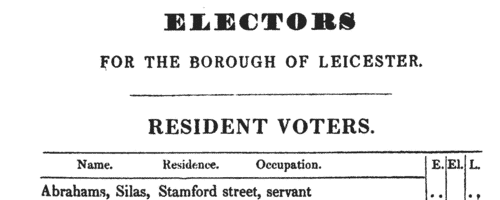Add this eBook to your basket to receive access to all 3,449 records. Our indexes include entries for the spelling mitchell. In the period you have requested, we have the following 3,449 records (displaying 1,261 to 1,270): These sample scans are from the original record. You will get scans of the full pages or articles where the surname you searched for has been found. Your web browser may prevent the sample windows from opening; in this case please change your browser settings to allow pop-up windows from this site. Boys entering Elizabeth College, Guernsey
(1831)
Elizabeth College, Guernsey, was founded in 1563 and rechartered in 1825. Charles James Durand, Kentish Brock and Edward Charles Ozanne compiled this edition of the college register, published in 1898. The names are arranged by term of entering the school, with a sequential number, surname and christian names in bold: then place and date of birth, father's name or reference to a brother previously at the school; and year of leaving. Beneath that, in smaller type, the compilers put what they could glean about the boy's subsequent career. | Sample scan, click to enlarge

| Boys entering Leeds Grammar School
(1831)
The admission books for Leeds Grammar School from 1820 to 1900 were edited by Edmund Wilson and published in 1906. The series of registers is almost complete for the period, there being in addition admission registers for the Lower (or Commercial) Department from 1856 to 1865, and lists of boys in the school in 1856, and in the Commercial Department in 1861. The entries are arranged by date or term of admission: a sequential number is given first, then surname, christian name, and, after a dash, father's christian name, occupation, and address; another dash, and then the age of the boy at admission, and often his year of leaving (with the abbreviation r. for 'removed' or 'left'). r.* means left without notice; (o) or S. or Stranger or Foreigner indicates a boy not on the foundation. The editor was unable to divine the meaning of the abbreviation (Q) or the asterisks prefixed to most entries in 1856 to 1860, but dutifully copies them into the text. In smaller type he then proceeds, where possible, to add some information about the boy's subsequent career. | Sample scan, click to enlarge

| Cambridgeshire Voters: Cambridge
(1832)
The poll on the election of three knights of the shire to serve in Parliament for the county of Cambridge, was taken at Cambridge, Royston, Newmarket, Ely, Wisbech and Whittlesea 18 and 19 December 1832. The candidates were Henry John Adeane esquire, Richard Greaves Townley esquire, Charles Philip Yorke esquire and John Walbanke Childers esquire. This poll book sets out the names of the voters in alphabetical order hundred by hundred and parish by parish. The voters' full names are stated, surname first. The right hand column records their votes. The new qualification for suffrage in the counties, after the passage of the 1832 Great Reform Bill, was the possession of a freehold estate worth 40s a year or more, a copyhold or long leasehold of £10 a year or more, or a tenancy or short leasehold of £50 a year or more.
| Sample scan, click to enlarge

| Cambridgeshire Voters: Little Shelford
(1832)
The poll on the election of three knights of the shire to serve in Parliament for the county of Cambridge, was taken at Cambridge, Royston, Newmarket, Ely, Wisbech and Whittlesea 18 and 19 December 1832. The candidates were Henry John Adeane esquire, Richard Greaves Townley esquire, Charles Philip Yorke esquire and John Walbanke Childers esquire. This poll book sets out the names of the voters in alphabetical order hundred by hundred and parish by parish. The voters' full names are stated, surname first. The right hand column records their votes. The new qualification for suffrage in the counties, after the passage of the 1832 Great Reform Bill, was the possession of a freehold estate worth 40s a year or more, a copyhold or long leasehold of £10 a year or more, or a tenancy or short leasehold of £50 a year or more.
| Sample scan, click to enlarge

| Cambridgeshire Voters: Swavesey
(1832)
The poll on the election of three knights of the shire to serve in Parliament for the county of Cambridge, was taken at Cambridge, Royston, Newmarket, Ely, Wisbech and Whittlesea 18 and 19 December 1832. The candidates were Henry John Adeane esquire, Richard Greaves Townley esquire, Charles Philip Yorke esquire and John Walbanke Childers esquire. This poll book sets out the names of the voters in alphabetical order hundred by hundred and parish by parish. The voters' full names are stated, surname first. The right hand column records their votes. The new qualification for suffrage in the counties, after the passage of the 1832 Great Reform Bill, was the possession of a freehold estate worth 40s a year or more, a copyhold or long leasehold of £10 a year or more, or a tenancy or short leasehold of £50 a year or more.
| Sample scan, click to enlarge

| Free Burgesses of Newcastle-upon-Tyne
(1832)
The parliamentary election to represent Newcastle-upon-Tyne (with the townships of Benwell, Byker, Heaton, Jesmond and Westgate) took place on 13 and 14 December 1832. Under the Reform Act, the franchise was available to freeholders worth 40s a year or over; copyholders and long leaseholders of £10 or more; short leaseholders and tenants of £50 or more: but limited to adult males. This poll book lists the free burgesses and the householders separately, in each case giving full name, profession, address, and showing whether voting for sir Matthew White Ridley (R.), John Hodgson (H.) or Charles Attwood (A.). Each voter had two votes, but could opt to plump (X) for a single candidate. | Sample scan, click to enlarge

| Householders of Newcastle-upon-Tyne
(1832)
The parliamentary election to represent Newcastle-upon-Tyne (with the townships of Benwell, Byker, Heaton, Jesmond and Westgate) took place on 13 and 14 December 1832. Under the Reform Act, the franchise was available to freeholders worth 40s a year or over; copyholders and long leaseholders of £10 or more; short leaseholders and tenants of £50 or more: but limited to adult males. This poll book lists the free burgesses and the householders separately, in each case giving full name, profession, address, and showing whether voting for sir Matthew White Ridley (R.), John Hodgson (H.) or Charles Attwood (A.). Each voter had two votes, but could opt to plump (X) for a single candidate. | Sample scan, click to enlarge

| Leicester Poll Book: Resident Non-Voters
(1832)
A poll was taken on 12 and 13 December 1832 for the election of two representatives in Parliament for the borough of Leicester, the candidates being William Evans esquire (E.), Wynn Ellis esquire (El.) and J. W. Boughton Leigh esquire (L.). This poll book, printed by J. G. Brown of Leicester, gives the name, residence and occupation of all the electors, divided into four categories: resident voters, non-resident voters, resident non-voters, and non-resident non-voters. For those who polled, their votes are marked on the right hand side. Under the 1832 Reform Act the franchise within the borough had been extended to all (adult male) owners or tenants of property worth £10 a year or more. | Sample scan, click to enlarge

| Leicester Poll Book: Resident Voters
(1832)
A poll was taken on 12 and 13 December 1832 for the election of two representatives in Parliament for the borough of Leicester, the candidates being William Evans esquire (E.), Wynn Ellis esquire (El.) and J. W. Boughton Leigh esquire (L.). This poll book, printed by J. G. Brown of Leicester, gives the name, residence and occupation of all the electors, divided into four categories: resident voters, non-resident voters, resident non-voters, and non-resident non-voters. For those who polled, their votes are marked on the right hand side. Under the 1832 Reform Act the franchise within the borough had been extended to all (adult male) owners or tenants of property worth £10 a year or more. | Sample scan, click to enlarge

| Liverpool Voters: Parish of Liverpool
(1832)
A poll for the election of Members of Parliament for the Borough of Liverpool, between William Ewart esquire (E), Lord Viscount Sandon (S), Thomas Thornely esquire (T) and Major-General Sir Howard Douglas, baronet (D), took place on 12 and 13 December 1832. The poll book lists all voters with full name (surname first), occupation, address, and initials indicating for whom they voted. The lists are in six sections: Everton, Kirkdale, the parish of Liverpool, Toxteth Park, West Derby, and Liverpool burgesses and freemen. All householders of property worth £10 a year of more were entitled to vote. | Sample scan, click to enlarge

|
Research your ancestry, family history, genealogy and one-name study by direct access to original records and archives indexed by surname.
|











